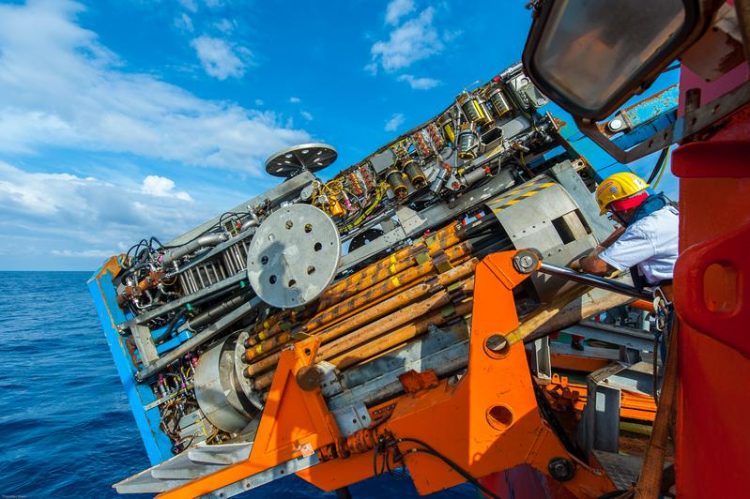Carbon and Life in Deep Seafloor Rocks

The sea floor drill-rig MARUM-MeBo MARUM, University of Bremen
On October 26th, an international team of scientists will sail from Southampton, UK, on board the British Royal Research Vessel James Cook. During a 6-week expedition in the Atlantic Ocean the team will explore the Atlantis Massif, a prominent, nearly 4,000 metre high underwater mountain which is part of the world`s longest mountain chain.
Led by Co-Chief Scientists Gretchen Früh-Green, ETH Zurich, Switzerland, and Beth Orcutt, Bigelow Laboratory for Ocean Sciences, USA, the team will collect cores of rocks using seabed rock drills. The plan is to drill at 11 sites in water depths of 720 to 1,770 metres and to recover cores between 50 and 70 metres in length.
“Scientifically the sea bed is remarkable because the Atlantis Massif is made up of rocks from the Earth's mantle”, says marine geologist Gretchen Früh-Green, who explored this remarkable sub-seafloor region already during expeditions in 2003 and 2005.
“In the presence of seawater these rocks produce the greenhouse gas methane, hydrogen and heat, among other things.” Such rock reactions excite scientists because they represent possible sources to fuel life in the absence of sunlight and may be analogous to conditions found on other planets, or early in Earth's history.
“Among other things we hope to learn more about what kind of life exists on and within rocks at the Atlantis Massif”, says marine microbiologist Beth Orcutt. “Moreover we shall investigate the fate of carbon. Do the reactions between rocks and seawater lead to carbon storage in the seafloor? And does this process impact the global carbon cycle and our climate?”
Overall the expedition aims to study
• how mantle rocks are brought up to the seafloor,
• how the rocks react with seawater,
• how carbon is cycled during this process,
• what type of life exists on and within the rocks and how organisms can survive in this extreme environment.
The expedition is conducted by the European Consortium for Ocean Research Drilling (ECORD) as part of the International Ocean Discovery Program (IODP). Two rock drills were installed on the RRS James Cook, operated by the British Geological Survey and MARUM, the Center for Marine Environmental Sciences in Bremen/Germany. It is the first expedition of this kind to use this type of remotely operated drilling technology.
Contact / Interviews / Images / Videos:
Albert Gerdes
MARUM
University of Bremen/Germany
Email: agerdes@marum.de
Alan Stevenson
British Geological Survey
Email: agst@bgs.ac.uk
http://www.eso.ecord.org/expeditions/357/357.php – about the expedition
http://www.ecord.org/p/msp.html – photos etc.
http://www.iodp.org – about the International Ocean Discovery Program IODP
http://www.ecord.org – about the European part of IODP
Media Contact
All latest news from the category: Earth Sciences
Earth Sciences (also referred to as Geosciences), which deals with basic issues surrounding our planet, plays a vital role in the area of energy and raw materials supply.
Earth Sciences comprises subjects such as geology, geography, geological informatics, paleontology, mineralogy, petrography, crystallography, geophysics, geodesy, glaciology, cartography, photogrammetry, meteorology and seismology, early-warning systems, earthquake research and polar research.
Newest articles

Innovative vortex beam technology
…unleashes ultra-secure, high-capacity data transmission. Scientists have developed a breakthrough optical technology that could dramatically enhance the capacity and security of data transmission (Fig. 1). By utilizing a new type…

Tiny dancers: Scientists synchronise bacterial motion
Researchers at TU Delft have discovered that E. coli bacteria can synchronise their movements, creating order in seemingly random biological systems. By trapping individual bacteria in micro-engineered circular cavities and…

Primary investigation on ram-rotor detonation engine
Detonation is a supersonic combustion wave, characterized by a shock wave driven by the energy release from closely coupled chemical reactions. It is a typical form of pressure gain combustion,…



